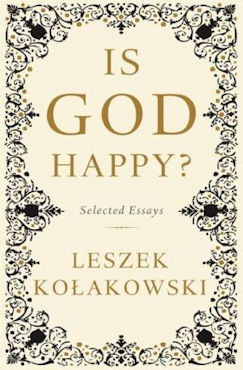
|
Posted July 1, 2013
Book: Is God Happy? Author: Leszek Kolakowski Basic Books. New York. 2013. Pp. 327 An Excerpt from the Jacket:
The late Leszek Kolakowski was one of the most influential philosophers of the twentieth century. A prominent anticommunist writer, Kolakowski was also a deeply humanistic thinkers, and his meditations on society, religion, morality and culture stand alongside his political writings as commentaries on intellectual --- and everyday --- life in the twentieth century. Kolakowski's extraordinary empathy, humor, and erudition are on full display in Is God Happy?, the first collection of his work to be published since his death in 2009. Accessible and wide ranging, these essays --- many of them translated into English for the first time --- testify to the remarkable scope of Kolakowski's work. From a provocative and deeply felt critique of Marxist ideology to the witty and welf-effacing "In Praise of Unpunctuality" to a rigorous analysis of Erasmus' model of Christianity and the future of religion, these essays distill Kolakowski's lifelone engagement with the eternal problems of philosophy and some of the most vital questions of our age. An Excerpt from the Book: The Hope of eliminating violence from human relations. This is a hope that often seems to us to be particularly utopian and naive. Indeed, we can say with no hesitation that we have never seen a Christian who took his Christianity literally and really turned the other cheek. But this injunction is one thing when taken literally and something rather different in its restricted version, which demands the elimination of the sources of violence. No one expects Christians literally to fulfill the commandments of the Gospels; it is expected only that they take seriously the simple and elementary rules of tolerance laid out therein, and refrain from violence. But even this expectation is often considered wildly extravagant. People who like to pride themselves on their realism --- as if this word meant anything, or as if any concrete directives could flow from its acceptance --- consider the idea of abolishing violence a laughable one. But who is being naive here? Those who think, despite all the evidence of human history, that it is possible to diminish the part violence plays in human relations, that much has been already been achieved toward this end, and that more can be peacefully achieved? Or those who imagine that nothing can be accomplished without the use of force, and in particular conversely: that with it everything can be accomplished? No oppo0nent of Christianity can deny that Christianity achieved without the use of force a position in which it could use force against others, and use the name of Jesus as an instrument of torture. It is also true that some forms of practical action based on the principle of applying pressure without violence (for instance, the strategy of Gandhi) have been quite successful. The principle of refraining from violence in international relations is verbally accepted almost universally. Yes, verbally, someone may say: so what? Well, plenty I would reply. Those values which are verbally accepted and violated in practice are verbally accepted only because of the pressure of universal opinion, which forces agreement. There is no need to despair over hypocrisy; we should rather, accept hypocrisy is the testimony to the real social power of those values behind which it hides --- the homage that vice pays to virtue, as La Roche-foucauld put it. Until quite recently heads of state did not hesitate openly to announce policies of expansion by war and conquest; but such announcements are now very rare; the idea of a world without violence is not a ludicrous fancy. It is not those who believe that use of force can decline, and who strive to bring about this decline, who are naive, but those who believe that force can resolve everything. This belief is like a kind of infantile fixation. The use of force toward children is unavoidable up to a certain age, but generally decreases with age; sometimes, however, parents extend the use of force for too long and beyond what is necessary. A person brought up in this way generally acquires the conviction that nothing except force can possibly regulate human relations. He builds an infantile view of the world from his own infantile experiences, promoting them to the status of a primitive philosophy of history, which he proudly calls "realistic", without illusions, etc. In fact, the belief in the omnipotence of force is not only naive but also, in the long run, self-defeating: we know that collectivities which rely only on force and childishly believe in its universal effectiveness are doomed; they cannot survive, precisely because they cannot cope in situations where force is useless. On the other hand, people who are persistent and resolute often achieve their aims without the use of force, but rather by courage joined with intelligence. Renouncing force need not mean resigned passivity or cowed submission: Christ renounced force, but fought relentlessly for his own point of view; and in dying he broke the resistance of those who wielded power and were in a position to use force. The idea of life without force is neither stupid nor utopian. It calls only for courage --- a virtue which is most lacking in those who worship force as a universal method, for they are prepared to fight only when they are in a position to use force against those who are weaker, never otherwise. Table of Contents: 1. Socialism, ideology and the left 2. Religion, God and the problem of evil 3. Modernity, truth, the past and some other things |
|
